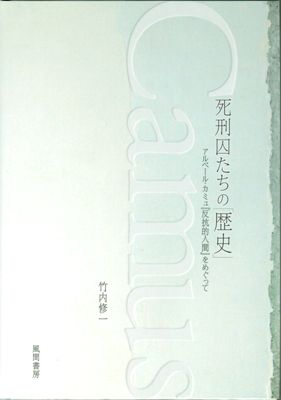Profile
- Research Subject
Research on Albert Camus, secularization (laicization) and literature.
- Research Fields
- French literature
- Faculty - Division / Research Group / Laboratory
- Division of Humanities / Research Group of Cultural Representations / Laboratory of European and American Literature
- Graduate School - Division / Department / Laboratory
- Division of Humanities / Department of Cultural Representations / Laboratory of European and American Literature
- School - Course / Laboratory
- Division of Humanities and Human Sciences / Course of Linguistics and Literature / Laboratory of European and American Literature
- Contact
Office/Lab: 417
Email: bambou(at)let.hokudai.ac.jp
Replace “(at)” with “@” when sending email.Foreign exchange students who want to be research students (including Japanese residents) should apply for the designated period in accordance with the “Research Student Application Guidelines”. Even if you send an email directly to the staff, there is no reply.- Related Links
Lab.letters


Camus’ The Rebel (French: L’Homme révolté) on the subject of homicide in an age without gods
The Rebel, an essay that Camus – known for The Stranger – described as his “most important book” has rarely been reviewed in the realm of research on French literature. My own response to that essay, an essay with which I’ve long been involved and which focuses on the theme of homicide in an age without gods, is summarized in The History of Condemned Convicts: Regarding The Rebel by Albert Camus (published by Kazama Shobo). These days, I’m also interested in the relationship between historical monuments and literary figures that both play a role in coalescing people’s memories in societies less affected by religions. In the Dictionary of French Culture published by Maruzen, I was in charge of compiling items regarding the Pantheon, a mausoleum for mundane “great men” but not for “saints,” as well as the Arc de Triomphe (Arch of Triumph), under which an unknown soldier is enshrined.
Fostering writing skills based on the format of the thesis
High school students in France learn philosophy and practice writing long passages that are comparable to essays, whereas those in Japan don’t start practicing writing in earnest until university and after. I’d like you to cultivate writing skills that enable you to present your own views, based on the format of the thesis.
Hokkaido University provides students with opportunities to study overseas. Some graduate students from Hokkaido University also play active roles as researchers in the realm of French literature. I’m cordially looking forward to welcoming students who are motivated to carry out research on profound French literature.
Message
Certainly, there was once a time when literature attracted many young people and would-be researchers on literature were seen ubiquitously. In recent years, however, the number of young people who are interested in specialty literature fields bearing a national name such as French, English and German has been declining. A growing interest in media (including movies and the Internet) other than books and magazines can be identified as the cause. More importantly, however, the obviousness of literature has become questionable. It seems likely that the impression of the word “literature” at present is quite different from that in the past. In 1946, Jean-Paul Sartre published a book titled with the question of “What is literature?” But the fact that such a question is universal means that one can no longer believe that it holds true anywhere or at any time.
If you wish to research literature even in times such as these, you must be determined to take interest in writers or literary theories, consistently read texts, interpret them and complete your thesis. You also need to conduct research on literature itself from a historically relative perspective.
Although what I mentioned above was too formal and perhaps a bit stiff, I would like to end by pointing out the importance of France. France, a country in which a revolution transpired, managed to make the entire world aware of values such as democracy, human rights and freedom. Of course, some writers and thinkers objected to such values in France. There is a true abundance of literary works from this country. I recommend that those who have learned French read texts written by enlightenment thinkers such as Rousseau and Diderot, poetry by Rimbaud and Verlaine, or novels such as Germinal by Zola and The Stranger by Camus. If you are interested in these works, why not familiarize yourself with French literature and study it at some point in your life?




